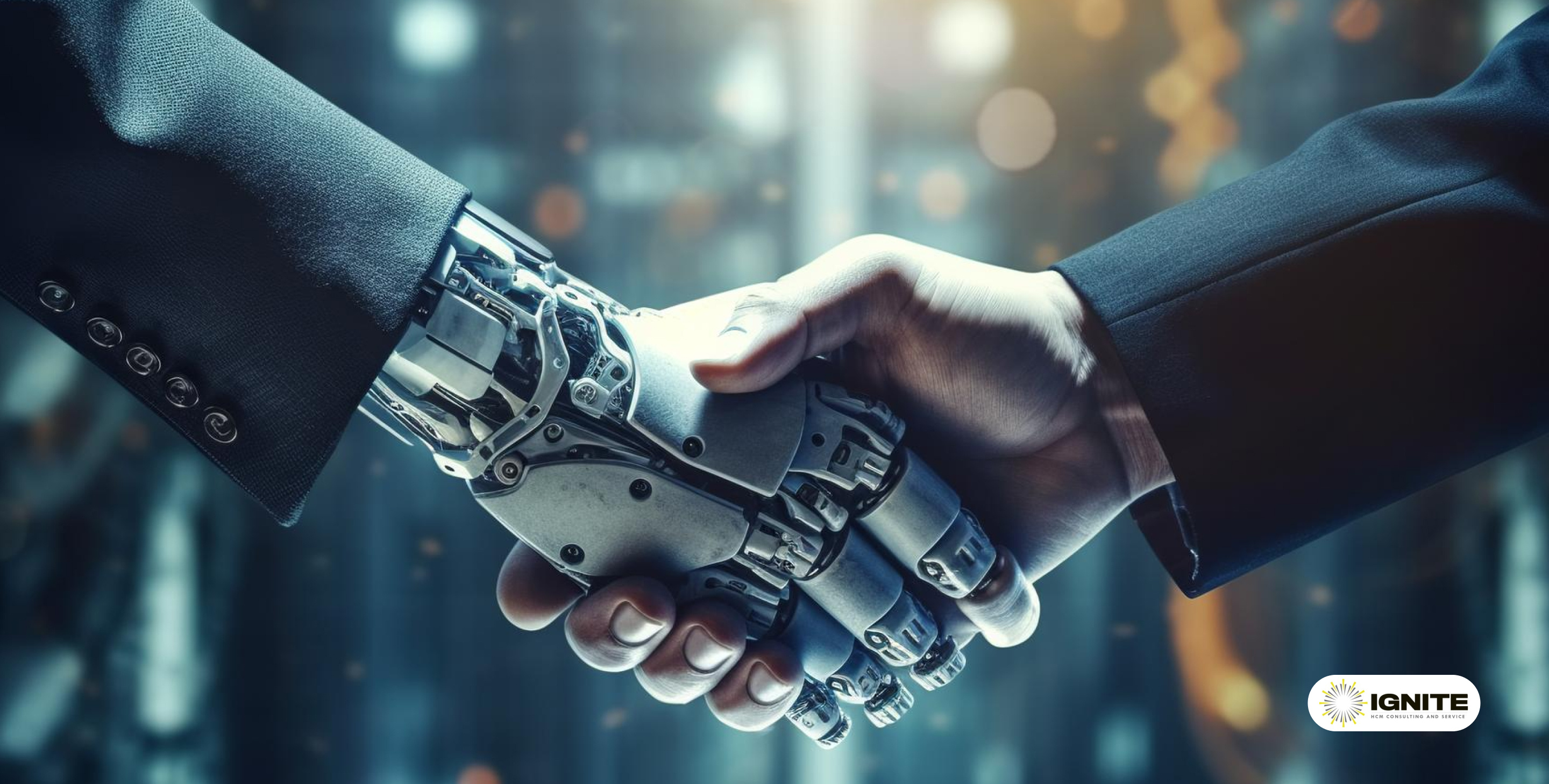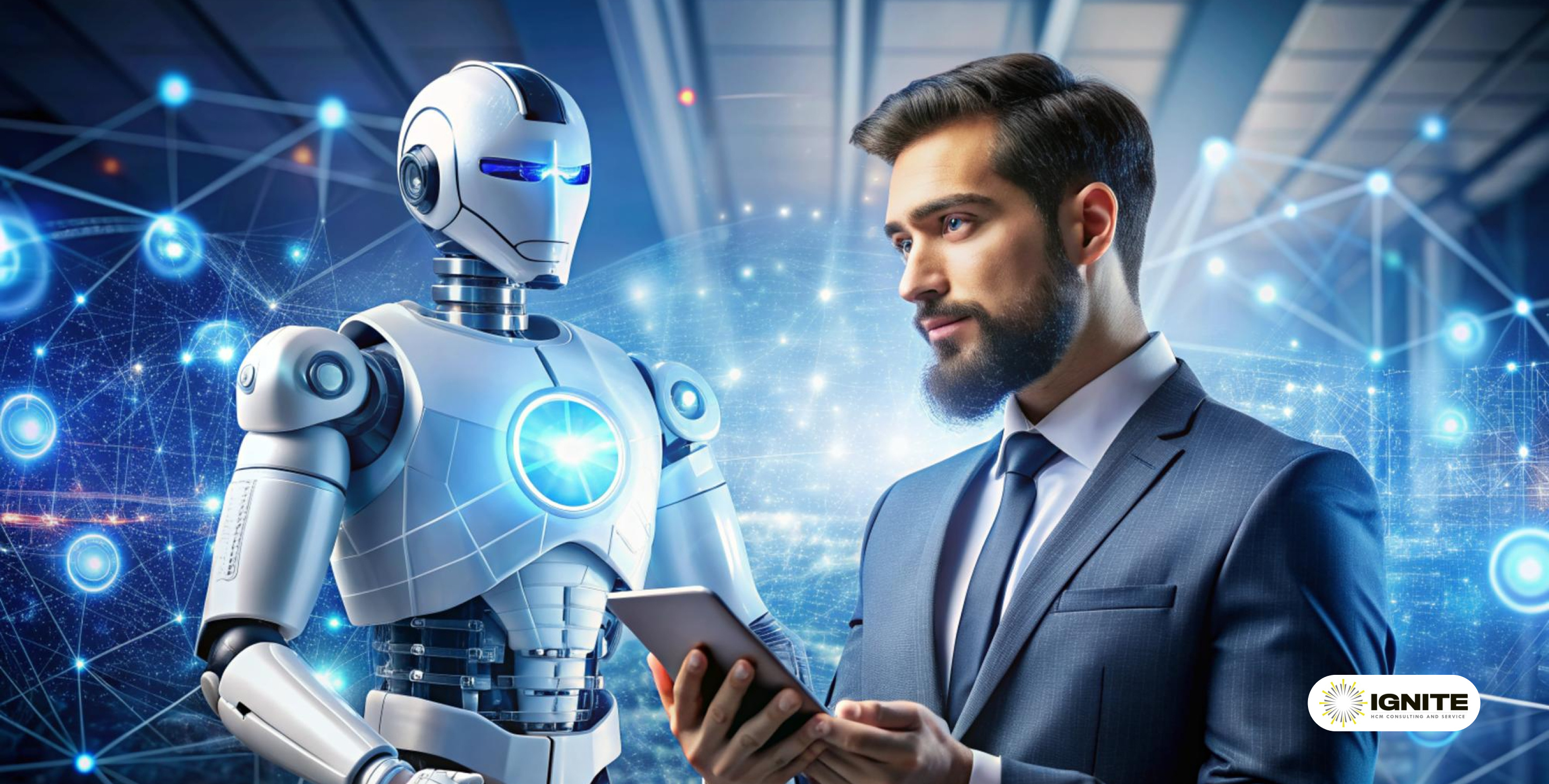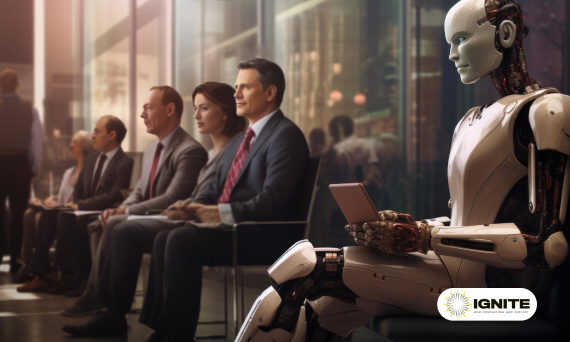In today's fast-paced business world, staying ahead of the curve is more important than ever. When managing your most valuable asset—your people—artificial intelligence (AI) is leading in revolutionizing human resources (HR). From streamlining mundane tasks to providing deep insights into employee behavior, AI is transforming HR processes and decision-making in ways previously unimagined. But what does this mean for you and your organization? Let's explore the exciting world of AI in HR.
The AI Awakening: Why HR is Embracing Artificial Intelligence
Picture this: You're an HR manager drowning in a sea of resumes, trying to find the perfect candidate for a critical role. Sound familiar? AI can help you sort through those resumes in record time and predict which candidates are most likely to succeed in your organization. That's just the tip of the iceberg regarding AI's potential in HR.
The AI Advantage: More Than Just a Time-Saver

While saving time is a significant benefit of AI in HR, it's far from the only one. Here are some key reasons why HR departments are embracing AI:
- Enhanced Decision-Making: AI algorithms can analyze vast amounts of data to provide insights humans might miss, leading to more informed decisions.
- Improved Employee Experience: From personalized onboarding to AI-powered career development tools, AI can help create a more engaging and satisfying work environment.
- Reduced Bias: By removing human biases from processes like recruitment and performance evaluations, AI can help create a more diverse and inclusive workplace.
- Predictive Analytics: AI can forecast everything from employee turnover to future skill needs, allowing HR to be proactive rather than reactive.
The AI Toolkit: Key Areas Where AI is Making Waves in HR
Now that we've established why AI is such a game-changer for HR, let's explore some specific areas where it's having the most significant impact:
1. Recruitment and Talent Acquisition: Finding the Perfect Match
AI-powered recruitment tools are revolutionizing how companies find and attract top talent:
- Resume Screening: AI algorithms can quickly scan thousands of resumes, identifying the most qualified candidates based on predetermined criteria.
- Chatbots for Candidate Communication: AI-powered chatbots can handle initial candidate inquiries, schedule interviews, and provide updates throughout the hiring process.
- Predictive Hiring: By analyzing data from successful hires, AI can help predict which candidates are most likely to excel in each role.
Pro Tip: While AI can significantly streamline the recruitment process, it's essential to maintain a human touch. Use AI to enhance, not replace, human judgment in hiring decisions.
2. Employee Onboarding: Making First Impressions Count
AI is helping companies create memorable onboarding experiences:
- Personalized Onboarding Plans: AI can analyze a new hire's background and role to create tailored onboarding experiences.
- Virtual Assistants: AI-powered assistants can guide new employees through paperwork, answer common questions, and provide information about company policies.
- Progress Tracking: AI can monitor a new hire's progress and provide real-time employee and manager feedback.
- Thought-Provoking Question: How might AI-powered onboarding change how new employees perceive and connect with their organizations?
3. Performance Management: Continuous Improvement Through Data
AI-driven continuous performance management is replacing annual performance reviews:
- Real-Time Feedback: AI can analyze employee performance data and provide ongoing feedback and suggestions for improvement.
- Objective Goal setting: AI algorithms can help set realistic, data-driven employee goals based on their roles and past performance.
- Identifying High-Potential Employees: AI can help identify top performers and future leaders within the organization by analyzing various performance metrics.
Mental Model: The Feedback Loop Think of AI-powered performance management as a continuous feedback loop:
- Data Collection
- Analysis
- Insights Generation
- Action
- Repeat
4. Learning and Development: Personalized Growth Opportunities
AI is ushering in an era of personalized learning experiences:
- Skill Gap Analysis: AI can assess an employee's current skills against those required for their role or desired career path, identifying areas for improvement.
- Customized Learning Paths: AI can create personalized training programs for each employee based on skill gaps and learning preferences.
- Adaptive Learning Platforms: AI-powered learning platforms can adjust content difficulty and pace based on an individual's progress and comprehension.
- Thought-provoking Statement: As AI continues to shape personalized learning experiences, we may see a shift from traditional degrees to more fluid, skills-based credentials in the workplace.
5. Employee Engagement and Retention: Keeping Your Best Talent Happy
AI is helping companies boost engagement and reduce turnover:
- Sentiment Analysis: AI can analyze employee communications and feedback to gauge overall sentiment and identify potential issues before they escalate.
- Predictive Attrition Models: By analyzing various data points, AI can help predict which employees are at risk of leaving, allowing HR to take proactive steps to retain top talent.
- Personalized Benefits Recommendations: AI can analyze an employee's demographics, lifestyle, and preferences to suggest the most relevant benefits options.
Framework: The Employee Engagement Pyramid Consider this AI-enhanced version of Maslow's Hierarchy of Needs for employee engagement:
- Basic Needs (AI ensures fair compensation and benefits)
- Security (AI predicts and addresses potential workplace issues)
- Belonging (AI-powered tools foster collaboration and communication)
- Esteem (AI provides personalized recognition and feedback)
- Self-actualization (AI supports individualized career development)
6. HR Analytics and Reporting: Data-Driven Decision Making
AI is transforming HR from a gut-feeling discipline to a data-driven powerhouse:
- Predictive Workforce Planning: AI can analyze historical data and market trends to forecast future workforce needs.
- Diversity and Inclusion Metrics: AI-powered analytics can help track and improve diversity and inclusion efforts across the organization.
- ROI on HR Initiatives: Advanced AI algorithms can help measure various HR programs and initiatives' impact and return on investment.
Pro Tip: While AI can provide valuable insights, combining these data-driven recommendations with human expertise and contextual understanding is crucial for the best results.
The Human Touch: Balancing AI and Emotional Intelligence in HR
As we embrace AI in HR, we must remember that human resources is, at its core, about people. While AI can provide invaluable insights and streamline processes, the human touch creates a positive work environment.
The Importance of Emotional Intelligence in the Age of AI
Emotional intelligence (EQ) is more critical than ever in an AI-driven HR landscape. Here's why:
- Building Relationships: While AI can analyze data, it can't replace the human ability to build genuine connections and trust with employees.
- Handling Complex Situations: AI may flag potential issues, but it takes human empathy and judgment to navigate sensitive employee situations effectively.
- Interpreting Context: AI can provide data, but humans must analyze it within the broader context of the organization and its culture.
- Fostering Creativity and Innovation: While AI can optimize processes, human creativity is essential for developing innovative HR strategies and solutions.
Thought-provoking Question: How can we ensure that the integration of AI in HR enhances rather than diminishes the human element of people management?
The AI-Human Partnership: A Framework for Success

To truly harness the power of AI in HR, we need to view it as a partnership between human expertise and artificial intelligence. Here's a framework for creating a successful AI-human collaboration in HR:
- Identify AI Opportunities: Assess your HR processes to determine where AI can add the most value.
- Upskill Your HR Team: Provide training on AI technologies and data analysis to ensure your team can effectively leverage AI tools.
- Implement AI Solutions Gradually: Start with pilot programs and scale up as you learn and refine your approach.
- Maintain Human Oversight: Establish transparent processes for human review and intervention in AI-driven decisions.
- Foster a Culture of Continuous Learning: Encourage your HR team to stay updated on AI developments and best practices.
Mental Model: The AI-Human Synergy Loop Think of the AI-human partnership as a continuous loop of improvement:
- AI provides data and insights
- Humans interpret and contextualize information
- Humans make decisions and take actions
- AI learns from the outcomes and refines its algorithms
- Repeat
The Future of AI in HR: Trends to Watch
As AI continues to evolve, so too will its applications in HR. Here are some exciting trends to keep an eye on:
- Natural Language Processing (NLP) for Enhanced Communication
NLP technology is becoming increasingly sophisticated, opening up new possibilities for HR:
- Advanced Chatbots: More natural and context-aware, can handle complex employee inquiries and provide personalized support.
- Sentiment Analysis: Improved NLP will allow for more accurate employee feedback and communication analysis, providing deeper insights into organizational culture and employee satisfaction.
- Virtual and Augmented Reality for Immersive Experiences
VR and AR technologies, powered by AI, will transform various HR functions:
- Virtual Onboarding: New hires could experience immersive, gamified onboarding experiences introducing them to company culture and processes.
- Skills Training: VR simulations could provide realistic, hands-on training experiences for various skills and scenarios.
- Blockchain for Secure and Transparent HR Processes
The integration of blockchain technology with AI could revolutionize HR data management:
- Verified Credentials: Blockchain could provide a secure, tamper-proof system for verifying employee credentials and work history.
- Smart Contracts: AI-powered intelligent contracts could automate various HR processes, from hiring to performance-based compensation.
- Ethical AI and Responsible HR Tech
As AI becomes more prevalent in HR, there will be an increased focus on ethical considerations:
- Algorithmic Bias Detection: Advanced AI systems will be developed to identify and mitigate biases in HR algorithms.
- Transparent AI Decision-Making: There will be a push for more explainable AI models that can clearly articulate the reasoning behind their recommendations.
Thought-Provoking Statement: As AI becomes more integrated into HR processes, we may need to redefine what it means to be "human" in Human Resources.
Embracing the AI Revolution: Tips for HR Professionals

Ready to dive into the world of AI-powered HR? Here are some practical tips to get you started:
- Start Small: Begin with pilot projects in specific areas, such as resume screening or chatbots for employee inquiries.
- Prioritize Data Quality: Ensure your HR data is clean, accurate, and well-organized to get the most out of AI tools.
- Focus on Employee Experience: Use AI to enhance, not replace, the human touch in HR processes.
- Stay Informed: Keep up with the latest AI developments and best practices in HR technology.
- Collaborate Across Departments: Work closely with IT and data science teams to implement and optimize AI solutions.
- Measure and Iterate: Regularly assess the impact of AI initiatives and be willing to adjust your approach based on results.
Pro Tip: Remember that implementing AI in HR is a journey, not a destination. Be patient, stay curious, and don't be afraid to experiment!
Conclusion: The Human-AI Synergy in HR
As we've explored throughout this article, AI is not just changing the way HR operates—it's revolutionizing the entire field. From streamlining recruitment processes to providing deep insights into employee engagement, AI empowers HR professionals to make more informed decisions and create better workplace experiences.
However, it's crucial to remember that AI is a tool, not a replacement for human expertise. The most successful organizations will find the right balance between leveraging AI's analytical power and maintaining the human touch that is essential to effective people management.
As we look to the future, one thing is clear: The integration of AI in HR is not just a passing trend—it's the new reality of our working world. By embracing this technology and learning to work alongside it, HR professionals can elevate their role, drive organizational success, and create exceptional employee experiences.
Are you ready to join the AI revolution in HR? The future is here, and it's time to seize its opportunities. In AI-powered HR, the sky's the limit—dream big, innovate boldly, and transform how we work, one algorithm at a time!






